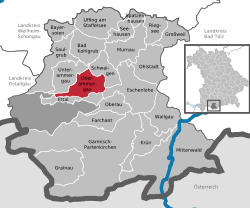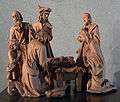Oberammergau
| Oberammergau | ||
|---|---|---|
|
Oberammergau from the summit of Kofel | ||
| ||
 Oberammergau | ||
Location of Oberammergau within Garmisch-Partenkirchen district  | ||
| Coordinates: 47°35′48″N 11°03′52″E / 47.59667°N 11.06444°ECoordinates: 47°35′48″N 11°03′52″E / 47.59667°N 11.06444°E | ||
| Country | Germany | |
| State | Bavaria | |
| Admin. region | Oberbayern | |
| District | Garmisch-Partenkirchen | |
| Government | ||
| • Mayor | Arno Nunn | |
| • Governing parties | CSU | |
| Area | ||
| • Total | 30.06 km2 (11.61 sq mi) | |
| Population (2015-12-31)[1] | ||
| • Total | 5,208 | |
| • Density | 170/km2 (450/sq mi) | |
| Time zone | CET/CEST (UTC+1/+2) | |
| Postal codes | 82487 | |
| Dialling codes | 08822 | |
| Vehicle registration | GAP | |
| Website | www.gemeinde-oberammergau.de | |
Oberammergau (Bavarian: Obaammagau) is a municipality in the district of Garmisch-Partenkirchen, in Bavaria, Germany. The town is famous for its production of a Passion Play, its woodcarvers, and the NATO School.
Passion Play
The Oberammergau Passion Play was first performed in 1634 and is the result of a vow made by the inhabitants of the village that if God spared them from the effects of the bubonic plague then sweeping the region they would perform a passion play every ten years. A man travelling back to the town for Christmas had accidentally brought the plague with him. The man died from the plague and it began spreading throughout Oberammergau. After the vow was made, not another inhabitant of the town died from the bubonic plague and all of the town members that were still suffering from the plague recovered. The play is now performed in years ending with a zero, as well as in 1934 which was the 300th anniversary and 1984 which was the 350th anniversary (though the 1940 performance was cancelled because of the intervention of the Second World War). It involves over 2000 actors, singers, instrumentalists and technicians, all residents of the village.
Oberammergau Passion Play 2010
About half the inhabitants of Oberammergau took part in the once-a-decade Passion Play in 2010.
This means that over 2,000 villagers brought the story of Jesus to life for the audiences that flocked in from around the world. The play started with Jesus entering Jerusalem, continued with his death on the cross and finished with the resurrection. As ever, this was an extraordinary community enterprise, in which only natives of the village could participate.
2010 saw a new production directed by Oberammergau native Christian Stückl, director at Munich's noted Volkstheater. He was supported by the artistic team that along with him staged the 2000 Passion Play: deputy director and dramatic adviser Otto Huber, set and costume designer Stefan Hageneier and music director Marxus Zwink and conductor Michael Bocklet - all from Oberammergau. The play started each day at 14.30 and including a three-hour supper interval ended at 22.30: an innovation, since previous productions had been performed in the morning and afternoon with a break for lunch. Performances took place between mid-May and early October 2010.
Traditional art
The village is also known as the home of a long tradition of woodcarving; the Bavarian State Woodcarving School is located there. Among the celebrated former students is the German artist Wolfram Aichele. His processional church staff depicting Christ on a donkey can be seen in the church of St Peter and St Paul. The streets of central Oberammergau are home to dozens of woodcarver shops, with pieces ranging from religious subjects, to toys, to humorous portraits.
Oberammergau is also famous for its "Lüftlmalerei," or frescoes, of traditional Bavarian themes, fairy tales, religious scenes or architectural trompe-l'œil found on many homes and buildings. Lüftlmalerei is common in Upper Bavaria and its name may be derived from an Oberammergau house called Zum Lüftl, which was the home of facade painter Franz Seraph Zwinck (1748–1792).
Tongue-twister
The name of the village (as well as that of neighbouring Unterammergau) appears in a well-known German tongue-twister, often sung as a round:
- German: Heut' kommt der Hans zu mir, / freut sich die Lies. / Ob er aber über Oberammergau, / oder aber über Unterammergau, / oder aber überhaupt nicht kommt, / ist nicht gewiß!
- English: Hans will come join with me, / rejoices Lies. / If he comes by way of Oberammergau / or by way of Unterammergau, / or if at all he comes, / that is not sure! [2]
Military
The Conrad von Hötzendorf Kaserne was built just east of the village in 1935–37 as a base for the signals detachment (Gebirgs-Nachrichten-Abteilung 54) of the Mountain Brigade. In October 1943,[3] the barracks were taken over by the Messerschmitt company as a research and development site; 37 km (23 mi) of tunnels were bored into the neighboring Laber mountain for engine production facilities, and a winter sports hotel was also taken over. In all, Messerschmitt had 500 employees in the design department and about 1,300 more in the factory.[4] At the end of the Second World War, the Messerschmitt design department was visited by both U.S. and British scientific missions, as well as by teams from Bell (who stayed for five weeks) and de Havilland.[5] Among the German staff interviewed by the Fedden Mission were Waldemar Voigt, Messerschmitt's chief designer, Hans Hornung, and Joseph Helmschrott.[6]
After the war, the Americans occupied the barracks, renaming it Hawkins Barracks and making it the primary facility of U.S. Army School Europe;[7] over the next three decades schools in specialties ranging from military police to nuclear weapons handling were located there. The base reverted to German Army control and its original name in 1974.
NATO School, formerly NATO Weapons Systems School, the alliance's principal training and education facility on the operational level, has been located at Hawkins Barracks/Hötzendorf Kaserne since 1953.
Gallery
 View of a street in Oberammergau, March 1930
View of a street in Oberammergau, March 1930- Example of Lüftlmalerei decorating homes in Oberammergau
- Example of Lüftlmalerei decorating homes in Oberammergau
- Scene of Little Red Riding Hood decorating a home in Oberammergau
 Lüftlmalerei adorning the facade of the Pilatushaus
Lüftlmalerei adorning the facade of the Pilatushaus- The parish church of SS. Peter and Paul
- The stage of the Passionspielhaus (2000)
 Crucifixion scene from the 1870 Passion Play
Crucifixion scene from the 1870 Passion Play The Kreuzigungsgruppe, a gift from King Ludwig II in commemoration of the 1870 Passion Play
The Kreuzigungsgruppe, a gift from King Ludwig II in commemoration of the 1870 Passion Play Traditional crucifix beside the Pilatushaus
Traditional crucifix beside the Pilatushaus Woodcarving of St Florian
Woodcarving of St Florian Nativity group, ca. 1840
Nativity group, ca. 1840 Woodcarvings for sale
Woodcarvings for sale Parish church: Organ gallery
Parish church: Organ gallery Parish church: Dome
Parish church: Dome The Kofel, Oberammergau's signature mountain
The Kofel, Oberammergau's signature mountain Oberammergau from the summit of the Kofel
Oberammergau from the summit of the Kofel The town and the river Ammer in 1900
The town and the river Ammer in 1900
References in popular culture
Oberammergau's carved wooden crosses appear in Hugo Hamilton's novel The Speckled People.
In the GWAR album Violence Has Arrived, 'Oberammergau' is the name of a hell beast that they use to transport themselves around the world. It is mentioned in the songs 'Anti-Anti-Christ' and 'The Song of Words'.
In Pat Conroy's novel The Prince of Tides, Savannah Wingo writes a poem which celebrates the "shy Oberammergau of the itinerant barber"; her praise for her grandfather's tradition of walking around town carrying a 90-pound cross every Good Friday.
The 1934 film Twentieth Century, starring John Barrymore, mentions the famous passion play.
In Maud Hart Lovelace's novel Betsy and the Great World, Betsy visits Oberammergau and meets many of the people involved in the passion play.
Also, the passion play inspired the Brazilians to create one of the largest outdoor theaters in the world, called New Jerusalem city theater in Pernambuco.
Jerome K Jerome wrote 'The Diary of a Pilgrimage' about his journey to see the Passion Play.
Mike Ramsdell teaches at the NATO school in his 2005 novel A Train To Potevka.
A song 'Oberammergau' by UK musician Christopher Rye (featuring Chinese rock band Taikonauts) is based on a reference in the book Dark Side of the Moon by Gerard de Groot, to Oberammergau being the destination for the rocket scientists fleeing Nazi Germany at the end of the Second World War, who then helped build the US space programme.
In the 1976 film Network, at seeing an audition tape, the character Diana Christensen (played by Faye Dunaway) shouts "We don't want faith healers, evangelists or Oberammergau passion players!"
German Schlager singer Peter Wackel released a song called "Oberammergau" on the compilation album "Oktoberfest 2008".
The 2014 album Eulogy for the Living by the band Ghostrain references Oberammergau in the song Sound at 11.
References
- ↑ "Fortschreibung des Bevölkerungsstandes". Bayerisches Landesamt für Statistik und Datenverarbeitung (in German). June 2016.
- ↑ The ditty is geographically nonsense; since the two villages are just 4 km apart in a narrow valley, it's not possible for Hans to come to anywhere by way of one but not the other.
- ↑ Christopher, John. The Race for Hitler's X-Planes (The Mill, Gloucestershire: History Press, 2013), p.91.
- ↑ Christopher, pp.155-6.
- ↑ Christopher, p.156.
- ↑ Christopher, p.157.
- ↑ Christopher, p.156.
External links
| Wikimedia Commons has media related to Oberammergau. |
| Wikivoyage has a travel guide for Oberammergau. |
- Official site (German)
- Tourist information
- NATO School Website
- Official English Website for Oberammergau Passion Play 2010
- History of the Passion Play
- melody for the tongue twister round
- Oberammergau - Russian site
